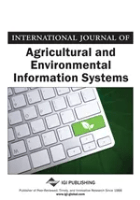
International Journal of Agricultural and Environmental Information Systems
Scope & Guideline
Empowering Research at the Intersection of Agriculture and Environment
Introduction
Aims and Scopes
- Agricultural Information Systems:
Focuses on the development and application of information technologies to improve agricultural practices, including data management, decision support systems, and innovative methodologies for data-driven agriculture. - Environmental Sustainability:
Examines the intersection of agriculture and environmental science, promoting research that addresses ecological impacts, resource management, and sustainable practices in agricultural systems. - Emerging Technologies in Agriculture:
Explores the integration of cutting-edge technologies such as IoT, machine learning, and big data analytics into agricultural practices, aiming to enhance efficiency and productivity while minimizing environmental footprints. - Agroecological Research:
Investigates ecological principles in agriculture, including studies on agroecosystems, biodiversity, and the impacts of agricultural practices on rural environments. - Data-Driven Decision Making:
Promotes research that employs data analytics and model-based approaches to support decision-making processes in agriculture, aiming to optimize resource use and improve crop yields.
Trending and Emerging
- Big Data in Agriculture:
The use of big data technologies to enhance rural economic revitalization and agricultural decision-making is a growing theme, highlighting the importance of data-driven approaches in modern agriculture. - IoT and Smart Agriculture:
The integration of Internet of Things (IoT) technologies into agricultural practices is increasingly prominent, focusing on smart farming solutions that improve efficiency, monitoring, and resource management. - Machine Learning Applications:
There is a rising trend in the application of machine learning for various agricultural purposes, including disease prediction and crop management, which demonstrates the journal's commitment to innovative analytical techniques. - Sustainability and Agroecology:
Research emphasizing sustainability and agroecological transitions is emerging, as scholars seek to address the environmental impacts of agricultural practices and explore sustainable alternatives. - Climate-Smart Agriculture:
The development of frameworks and ontologies for climate-smart agriculture signifies an increasing focus on adapting agricultural practices to changing climatic conditions, ensuring food security in a sustainable manner.
Declining or Waning
- Traditional Agricultural Practices:
Research on conventional farming techniques appears to be waning, possibly due to the increasing focus on modernization and the adoption of advanced technologies in agriculture. - Static Environmental Assessments:
Studies that provide static assessments of environmental impacts without the integration of dynamic data analytics are becoming less common, as the emphasis shifts toward real-time monitoring and adaptive management. - Basic Agricultural Mechanization Studies:
While mechanization remains important, papers focusing solely on basic mechanization methods without integrating smart technologies or data-driven approaches are becoming less frequent. - General Agricultural Economics:
Research that broadly addresses agricultural economics without a specific focus on data analytics or technological integration is declining, as there is a growing preference for studies that leverage big data for economic predictions. - Non-Data-Driven Approaches to Crop Management:
There is a noticeable decline in research that does not utilize data-driven methodologies for crop management, as the field increasingly values precision agriculture techniques.
Similar Journals
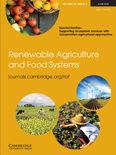
RENEWABLE AGRICULTURE AND FOOD SYSTEMS
Transforming food systems for a sustainable future.RENEWABLE AGRICULTURE AND FOOD SYSTEMS, published by Cambridge University Press, is a leading open-access journal dedicated to the advancement of sustainability in agricultural practices and food systems. With an ISSN of 1742-1705 and an E-ISSN of 1742-1713, this journal spans the interdisciplinary fields of agronomy and food science, achieving a commendable Q2 ranking in both categories for 2023. As it continues to converge through the years from 2004 to 2024, the journal offers a platform for researchers, professionals, and students to disseminate transformative research that addresses the challenges of food security, resource management, and environmental impact. The journal’s significant impact is underscored by its Scopus rankings, situating it in the 77th percentile among agronomy and crop science publications, and the 67th percentile in food science. Since becoming fully open access in 2023, RENEWABLE AGRICULTURE AND FOOD SYSTEMS promotes wider accessibility to vital research findings, fostering collaboration and innovation in the pursuit of sustainable agricultural practices and food systems worldwide.

JOURNAL OF AGRICULTURAL AND RESOURCE ECONOMICS
Cultivating insights that shape the future of agriculture.Journal of Agricultural and Resource Economics is a pivotal platform in the realm of agricultural and resource economics, published by the Western Agricultural Economics Association. Since its inception, the journal has embraced an Open Access model, fostering widespread dissemination of research findings to benefit both scholars and practitioners in the field. The journal operates within an impressive global ranking framework, resting in Q2 across several pertinent categories including Agronomy and Crop Science, Animal Science and Zoology, and Economics and Econometrics. With its ISSN 1068-5502 and E-ISSN 2327-8285, it has garnered attention for its rigorous academic standards and impactful contributions to the discourse on resource management and agricultural practices. Researchers, professionals, and students alike will find the journal's ongoing commitment to advancing knowledge invaluable, with publications that span from 1996 to 2024 capturing evolving trends and insights in the sector.
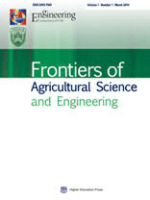
Frontiers of Agricultural Science and Engineering
Elevating agricultural practices with cutting-edge research.Frontiers of Agricultural Science and Engineering, published by HIGHER EDUCATION PRESS, is a distinguished open-access journal established in 2014, dedicated to advancing research across the fields of agricultural and biological sciences, biotechnology, and veterinary studies. With an impressive Q1 ranking in both Agricultural and Biological Sciences and Veterinary categories for 2023, this journal positions itself prominently within the academic landscape, reflecting the importance and quality of the research it disseminates. The journal serves as a vital platform for researchers, professionals, and students worldwide, featuring a broad array of studies that enhance our understanding of agricultural technologies, biotechnological innovations, and veterinary sciences. With a focus on rigor and accessibility, Frontiers of Agricultural Science and Engineering promotes the global exchange of knowledge, encouraging the collaboration that is essential for tackling contemporary challenges in these critical fields. Available online with a comprehensive range of article options, it continues to contribute to the scientific community's advancements in agricultural and biological disciplines.

Revista Brasileira de Ciencias Agrarias-Agraria
Pioneering insights for the next generation of agriculture.Revista Brasileira de Ciencias Agrarias-Agraria is an esteemed academic journal published by the Universidade Federal Rural de Pernambuco, dedicated to advancing the field of agricultural and biological sciences. With a focus on disseminating high-quality research, this journal plays a pivotal role in fostering knowledge exchange within the agricultural community, particularly in Brazil and beyond. As a Q3 ranked publication in the Agricultural and Biological Sciences category, Revista Brasileira de Ciencias Agrarias-Agraria contributes to the growing body of literature by featuring insightful articles from both emerging and established researchers in the field. The journal has been consistently published since 2011 and is committed to open access principles, ensuring that research findings are accessible to a wide audience. Researchers, professionals, and students will find this journal an invaluable resource for deepening their understanding of current trends and innovations in agriculture.

Icelandic Agricultural Sciences
Cultivating Knowledge for Sustainable AgricultureIcelandic Agricultural Sciences, published by RANNSOKNASTOFNUN LANDBUNADARINS, serves as a vital platform for the dissemination of research in the field of Agronomy and Crop Science. Established to contribute to the advancement of agricultural knowledge in Iceland and beyond, this journal aims to foster collaboration among researchers, professionals, and students dedicated to sustainable agricultural practices. Despite facing a Q4 category ranking in 2023 and a ranking of #344/406 in Scopus, the journal continues to attract diverse research contributions, especially focusing on unique challenges and innovations pertinent to Icelandic agriculture. The journal operates under a traditional access model, providing an essential resource for those looking to deepen their understanding of agronomic developments and their implications for the agricultural sector. With a commitment to increasing awareness and promoting scientific dialogues, Icelandic Agricultural Sciences plays a crucial role in nurturing the field's growth and enhancing agricultural research.
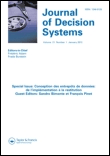
Journal of Decision Systems
Elevating Standards in Library and Information SciencesThe Journal of Decision Systems, published by Taylor & Francis Ltd, is a premier scholarly platform dedicated to advancing the fields of Library and Information Sciences, Management Information Systems, and Software. Since its inception in 1992, this journal has distinguished itself with a strong standing in the academic community, achieving a Q1 ranking in Library and Information Sciences and Q2 rankings in both Management Information Systems and Software as of 2023. With an impressive Scopus rank of #40 out of 280 in its primary discipline, the journal is situated in the top 85th percentile, making it a critical resource for researchers, professionals, and students striving to deepen their understanding of decision-making systems. Although not an open-access journal, it provides an essential repository of cutting-edge research and insights, serving as a valuable reference point for the ongoing discourse in decision systems. With a commitment to rigorous scholarship and a focus on current trends and challenges in this dynamic field, The Journal of Decision Systems plays a vital role in shaping knowledge and practice.

AIMS Agriculture and Food
Empowering research for a resilient food system.AIMS Agriculture and Food is a leading open access journal published by the American Institute of Mathematical Sciences (AIMS), focused on the critical intersections of agricultural and food sciences. Since its inception in 2016, this journal has provided a vital platform for disseminating innovative research and advancements in the fields of agricultural and biological sciences and food science. With impressive Scopus rankings, including a Q2 categorization in 2023 for both Agricultural and Biological Sciences (miscellaneous) and Food Science, AIMS Agriculture and Food is recognized for its significant contributions to the academic community. The journal aims to foster interdisciplinary dialogue by welcoming submissions that tackle contemporary challenges, promote sustainable practices, and enhance food security. Researchers, professionals, and students will find this journal an invaluable resource, offering open access to high-quality, peer-reviewed articles that are essential for informed decision-making in agriculture and food industries.

AgriEngineering
Pioneering Sustainable Solutions in Agronomy and EngineeringAgriEngineering is a premier Open Access journal, published by MDPI, focusing on innovative research across the disciplines of agronomy, horticulture, food science, and engineering. Established in 2019 and headquartered in Basel, Switzerland, this journal has rapidly gained recognition, evidenced by its robust performance in the Scopus rankings and its positioning in Q1 and Q2 quartiles of key categories, including Horticulture and Agronomy. With a commitment to disseminating high-quality research that advances agricultural engineering practices, AgriEngineering provides a platform for researchers, professionals, and students to explore cutting-edge developments aimed at enhancing food production systems and sustainability. Its Open Access model ensures wide-reaching accessibility to vital research outcomes, empowering global collaboration and innovation in the field. For more information on submission and access, you can visit the AgriEngineering website.
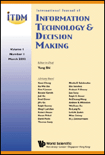
INTERNATIONAL JOURNAL OF INFORMATION TECHNOLOGY & DECISION MAKING
Exploring the Synergy of Technology and Strategic ChoicesINTERNATIONAL JOURNAL OF INFORMATION TECHNOLOGY & DECISION MAKING, published by WORLD SCIENTIFIC PUBL CO PTE LTD, stands as a premier platform in the realm of computer science, focusing particularly on the intersection of information technology and decision sciences. Established in 2002, the journal has consistently published high-quality research, now recognized as a Q1 journal in Computer Science (miscellaneous) as of 2023, ranking 15th out of 133 in its category, which underscores its excellence and influence in the field. Although it does not currently offer Open Access options, the journal remains accessible to a broad audience of researchers, professionals, and students who seek to enhance their understanding of innovative decision-making methodologies powered by information technology. With an emphasis on interdisciplinary collaboration, this journal is dedicated to advancing theoretical and practical knowledge, making it an essential resource for anyone looking to stay at the forefront of technology-driven decision-making processes.
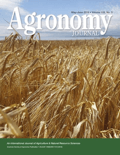
AGRONOMY JOURNAL
Shaping the Future of Crop Science with Quality LiteratureThe Agronomy Journal, published by Wiley, is a leading platform for cutting-edge research in the field of agronomy and crop science. Established in the United States, this prestigious journal carries the ISSN 0002-1962 and E-ISSN 1435-0645, with its coverage spanning from 1976 to 2024, showcasing a wealth of knowledge over decades. The journal is recognized in the top quartile (Q1) of its category, making it a highly respected source for quality literature, ranking #108 out of 406 in the Scopus database and reflecting a 73rd percentile standing in agricultural and biological sciences. While it operates under traditional access options, its commitment to disseminating valuable scientific inquiry aligns with the objectives of advancing sustainable agricultural practices globally. The Agronomy Journal serves as an indispensable resource for researchers, professionals, and students eager to stay abreast of significant advancements and discussions influencing the future of crop science and agronomic research.